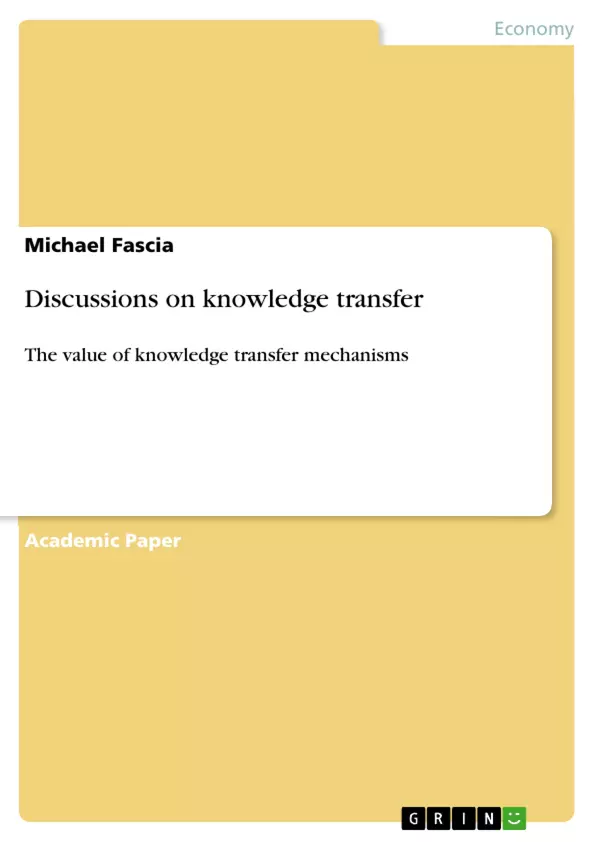Agreement within current literature accepts that appropriate techniques and strategies are needed to officiate the multi-faceted nature of knowledge and knowledge transfer processes in a business context. Further, complex mechanisms are essential to maintain and support the subsequent paradigms needed to orchestrate its usefulness to an organisation. In this paper we reflect on the multi-faceted resources, often found within a business framework, and consider if they must be within existing social context and are additional ‘structural’ features, which tend to augment complexity of any existing processes or procedures. We suggest that complex knowledge and knowledge transfer scenarios such as this reflect the number of interdependent technologies, routines, individuals, and resources, but must be linked to a particular knowledge or knowledge transfer mechanism to be effective. Although, in a business context, infrastructure may be desirable, the assumption from many arguments is that, given the correct framework of governance in whatever form it is described, knowledge derived from a governance framework will become valuable. As a focus for discussion, we suggest that a counter argument from this position may be that whilst the resultant transfer of knowledge may be useful to the business in terms of resource efficiency, any knowledge value will derive from the success of the transfer practices
Inhaltsverzeichnis (Table of Contents)
- Abstract
- Introduction
- Mechanisms
- Personalisation
- Discussion
Zielsetzung und Themenschwerpunkte (Objectives and Key Themes)
This paper explores the multifaceted nature of knowledge transfer mechanisms within a business context. It argues that while a governance framework is essential for supporting knowledge transfer, it is not sufficient for ensuring the value of knowledge. The paper highlights the importance of considering the cognitive positions of practitioners, the integration of different mechanisms, and the role of personal interpretation in facilitating successful knowledge transfer.
- The importance of a governance framework for knowledge transfer
- The role of cognitive positions of practitioners in knowledge transfer
- The need for a comprehensive understanding of knowledge transfer mechanisms
- The significance of personal interpretation in knowledge value
- The benefits of effective knowledge transfer for organizational success
Zusammenfassung der Kapitel (Chapter Summaries)
- Abstract: This section provides a brief overview of the paper's key arguments, highlighting the importance of appropriate knowledge transfer mechanisms and their role in organizational success. It emphasizes the multi-faceted nature of knowledge and knowledge transfer processes, and the need for a comprehensive understanding of the interplay between various factors.
- Introduction: The introduction delves into the existing literature on knowledge management and knowledge transfer, highlighting the importance of infrastructure and governed frameworks. It critiques the limitations of solely focusing on governance and argues for a more comprehensive understanding of the complexities of knowledge transfer mechanisms.
- Mechanisms: This chapter examines the various mechanisms needed to facilitate effective knowledge transfer, emphasizing the importance of process, decision-making, and integration. It explores two primary mechanisms: codification and personalization, highlighting their advantages and disadvantages.
- Personalisation: This chapter focuses on personalization as a key mechanism for knowledge transfer, exploring different types of transfer scenarios such as sequential, immediate, remote, considered, and proficient transfer. It emphasizes the role of individual capabilities and personal interpretation in knowledge value.
Schlüsselwörter (Keywords)
The key concepts and themes explored in this paper include knowledge, knowledge transfer, efficiency, success, mechanisms, process, governance, infrastructure, cognitive positions, personal interpretation, knowledge value, and organizational success.
- Quote paper
- Michael Fascia (Author), 2017, Discussions on knowledge transfer, Munich, GRIN Verlag, https://www.grin.com/document/421148



